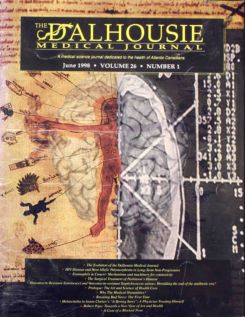Eosinophils in Cancer: Mechanisms and machinery for cytotoxicity
DOI:
https://doi.org/10.15273/dmj.Vol26No1.4420Abstract
Cancer is one of the leading causes of death in North America. For this reason, research into novel therapies to combat tumour growth is an area of intense investigation. Traditional treatment modalities for cancer patients, such as radiation and chemotherapy, have enjoyed only moderate success, partially because these treatments non-specifically target dividing cells and consequently are highly toxic to the patient, and also because some cancers are refractory to such measures. Recently, efforts have been focused towards enhancing the patient‘s immune response to the tumour. These "immunotherapy” strategies direct the specific recognition of neoplastic tissues, which confers protection from remaining or recurring tumour cells. Most cancer immunotherapy protocols presently under study are aimed towards enhancing type 1 T helper (Th1) immunity. Eosinophilia. traditionally associated with type 2 (Th2) immune responses, has been described in certain tumours and during cancer immunotherapy. Interestingly, correlations have been drawn between good prognosis for recovery and localized eosinophilia in the area of primary tumour. To date, these findings are controversial, as no in vivo evidence has demonstrated a direct role for eosinophils in mediating tumour damage. This review will first describe various proinflammatory and cytotoxic molecules produced by eosinophils, and suggest possible mechanisms of inducing anti-cancer immunity. Secondly, evidence suggesting the capacity of eosinophils to kill tumour cells will be provided. Although molecules involved in recruiting and activating eosinophils at the site of tumour growth are largely unknown, candidate molecules will be discussed. Furthermore, recent findings in our laboratory will be described which support the concept that eosinophil-activating cancer immunotherapy merits further investigation.
Downloads
How to Cite
Issue
Section
License
Authors who publish with this journal agree to the following terms:
- Authors retain copyright and grant the journal right of first publication with the work simultaneously licensed under a Creative Commons Attribution License that allows others to share the work with an acknowledgement of the work's authorship and initial publication in this journal.
- Authors are able to enter into separate, additional contractual arrangements for the non-exclusive distribution of the journal's published version of the work (e.g., post it to an institutional repository or publish it in a book), with an acknowledgement of its initial publication in this journal.
- Authors are permitted and encouraged to post their work online (e.g., in institutional repositories or on their website) prior to and during the submission process, as it can lead to productive exchanges, as well as earlier and greater citation of published work (See The Effect of Open Access).


